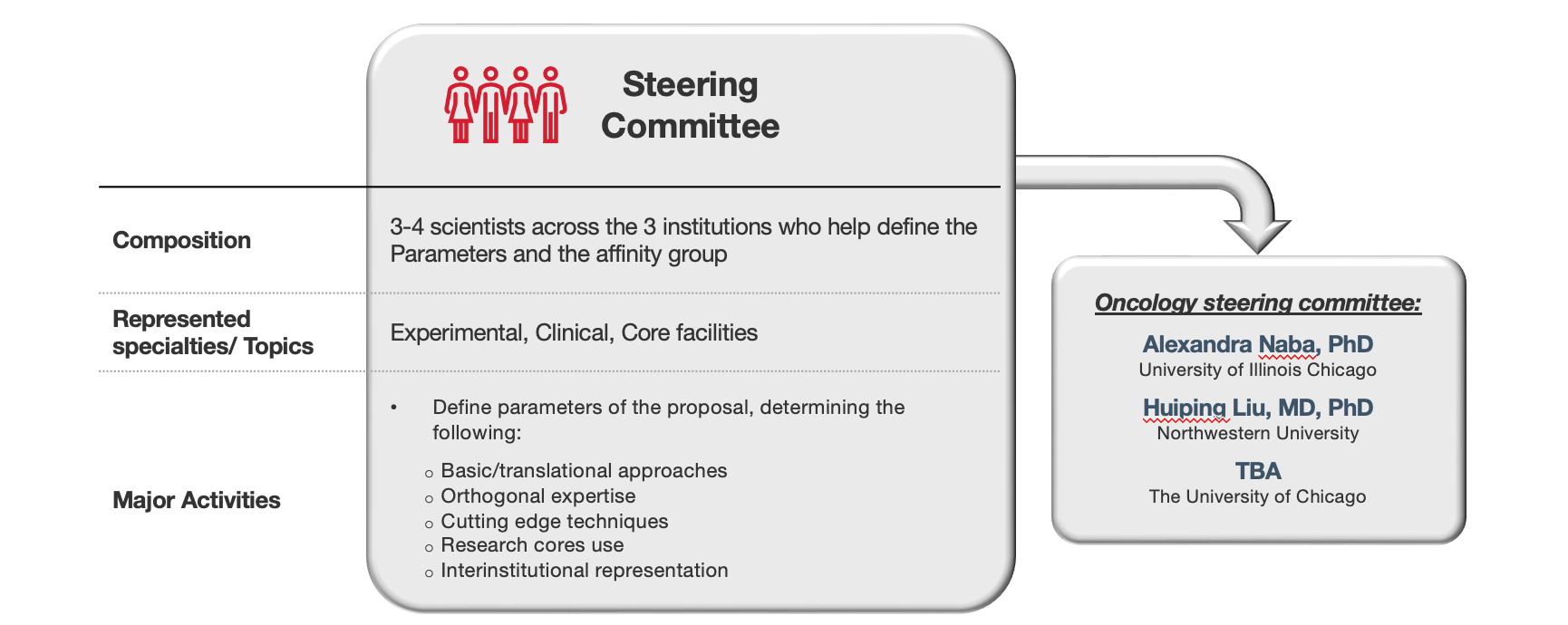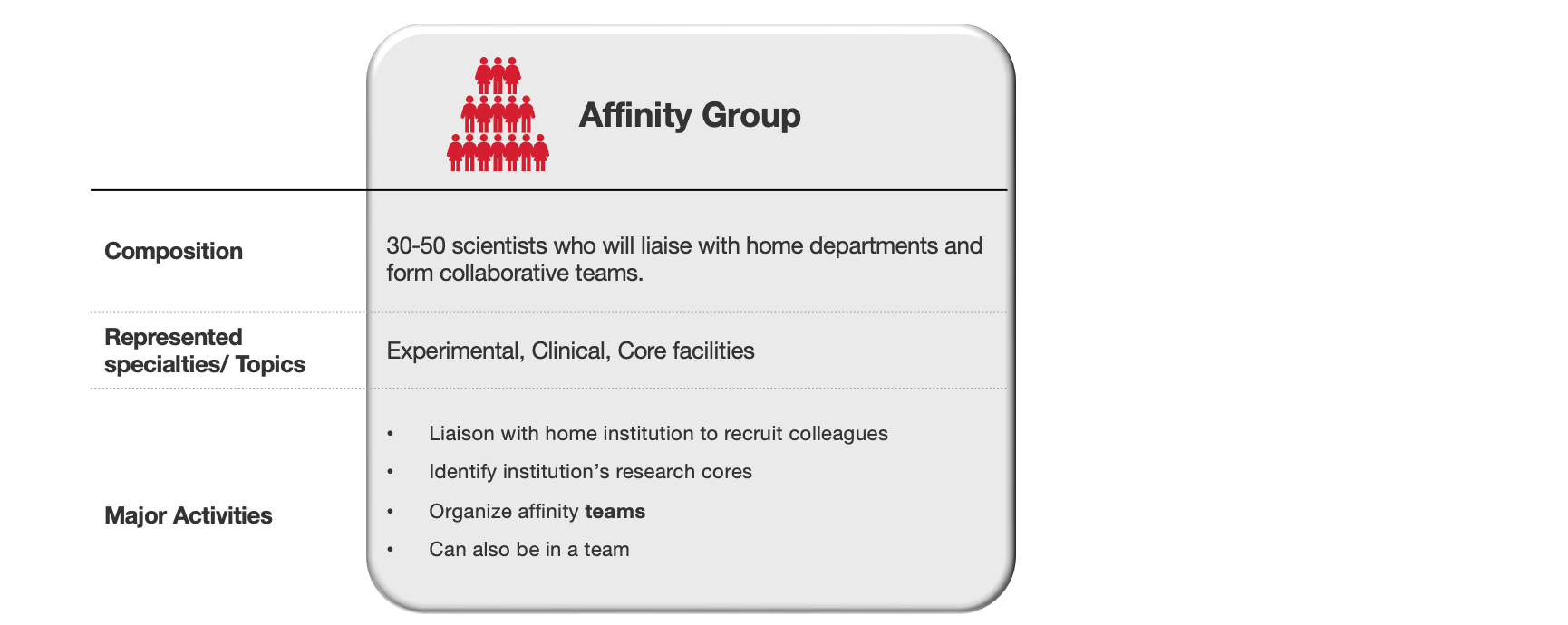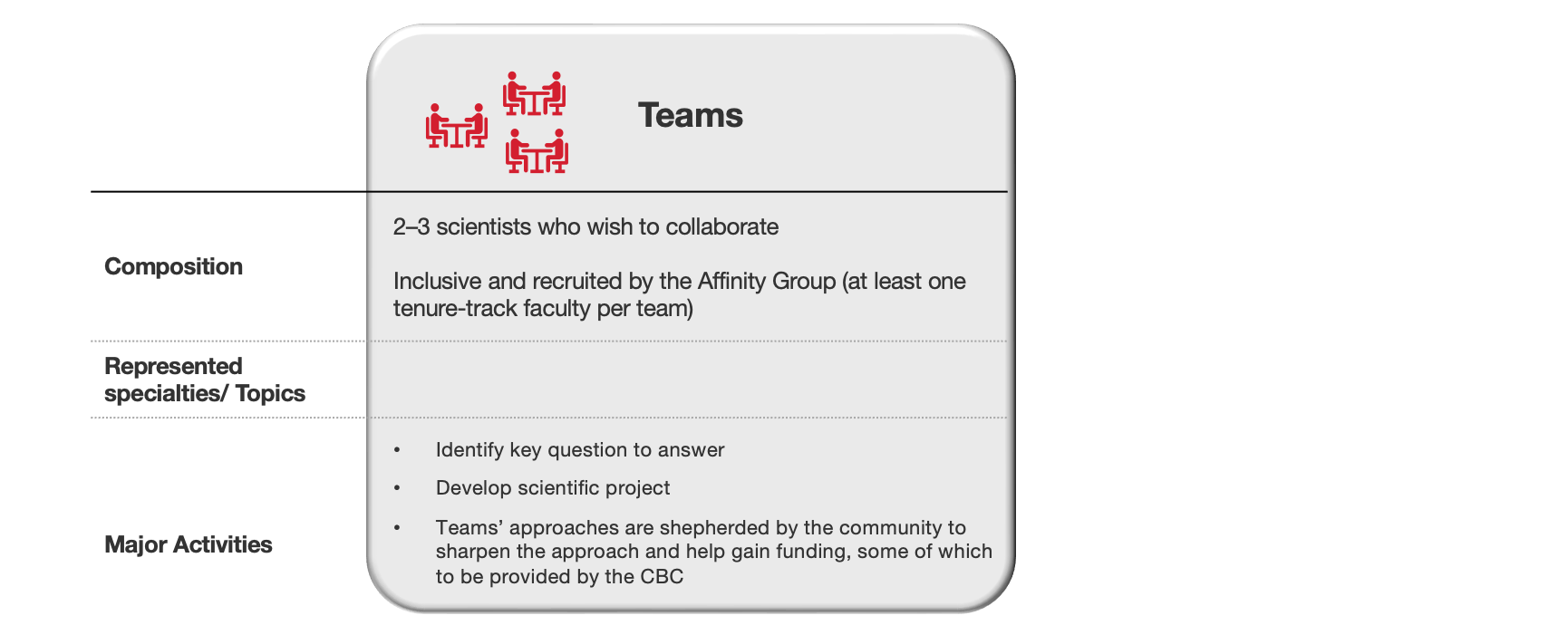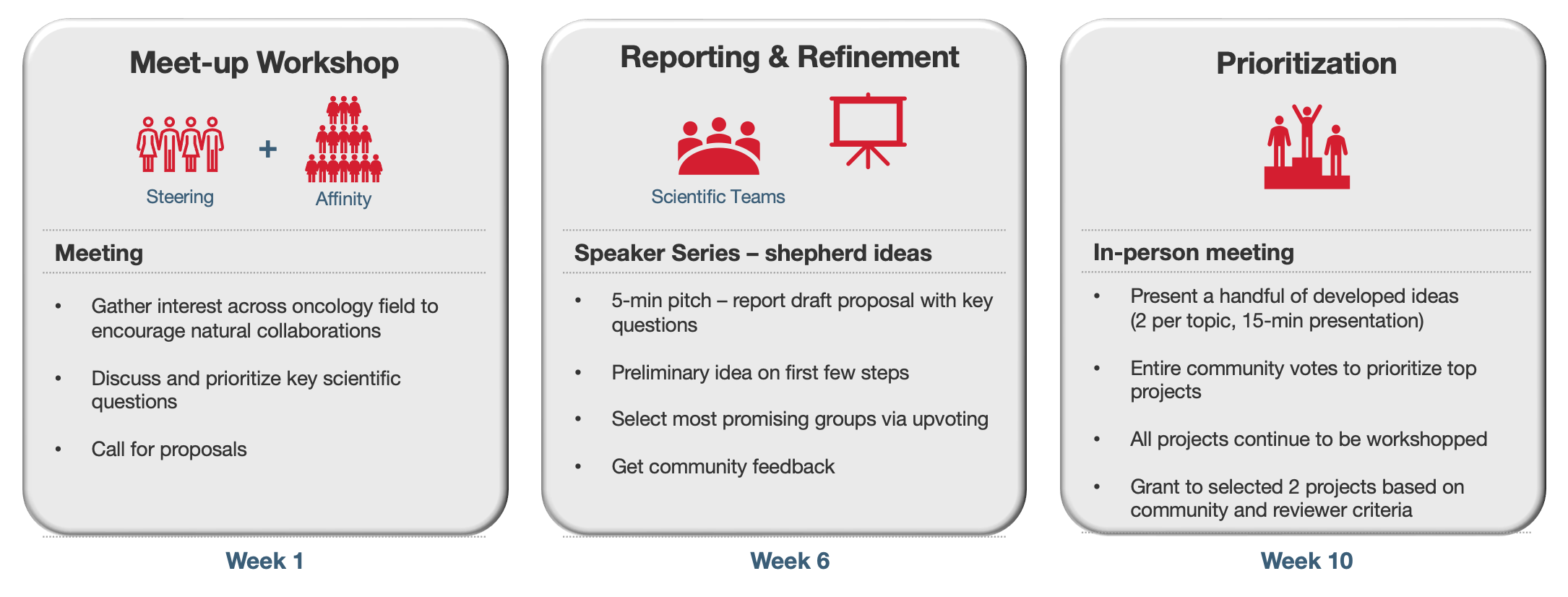Updated: October 19, 2023
The CBC Affinity Groups are cross-institutional communities centered around specific topics, which promote collaborative exploration of the community’s delineated key scientific questions. Based on Team Science concepts, the Affinity Group will engender collaborations which the community funds through inter-institutional $250,000 awards.
Oncology Affinity Group Overview
Goals I Components I Process I Details & Eligibility I Available Funding I LOI Preparation I LOI Submission I FAQS I Contact Us
GOALS:
This overarching goal of the Oncology Affinity Group to accelerate scientific breakthroughs by leveraging team science in the Oncology space. The Chicago Biomedical Consortium (CBC) is committed to funding some of the top ideas but anticipates that other funders will be interested if the platform is built to engender new collaborations for high-impact ideas.
The objectives of this program are to:

COMPONENTS:
The Affinity Group is an inclusive community of Chicago scientists. It is organized into different layers that determine the community’s most important questions and propose collaborative lines of inquiry for CBC, and potentially other foundation funding.
The goal is to build a collaborative platform where the CBC funds several high-priority collaborations, but which articulates a longer list of curated, vetted, collaborative approaches to fundamental questions that are attractive to many different funders. The members of the Affinity Group will have the opportunity to submit proposals for CBC funding, in return we ask for a commitment from the Affinity Group of approximately 14 hours over a 10-week period of time.
The layers are as follows:
- Steering Committee (3-4 people) The community rules of engagement are set by a Steering Committee of senior scientists from across the institutions who are committed to building the community. The Steering Committee is establishing an inclusive and diverse community for the next generation of scientists and should be foremost conscious of this goal.

- Oncology Affinity Group (30-50 people) This layer is the community of the Steering Committee, and the Scientific teams as follows:

- Oncology Teams are formed between 2-3 collaborative scientists to develop projects that address key questions.

- Oncology Teams are formed between 2-3 collaborative scientists to develop projects that address key questions.
PROCESS OVERVIEW:
The following process, to be refined by the Affinity Group itself, is proposed.
A detailed copy of the process can be downloaded HERE

ELIGIBILITY CRITERIA AND REQUIREMENTS:
- At least one of the Principal Investigators (PI) in the Scientific Team needs to be a tenure-track faculty member affiliated with a CBC member institution: Northwestern University, The University of Chicago, and/or University of Illinois Chicago.
- The Scientific Team must show the collaborative nature of the given project by providing a detailed research plan with shared resources.
- The Scientific Team’s participants should each be affiliated with a different home institution.
- The Scientific Teams should not already be funded for closely related research activities.
- Research projects submitted by Scientific Teams cannot be pending or under review at federal funding institutions/agencies.
- Funding is not expected to be distributed evenly among the CBC institutions.
- Multiple applications can be submitted from each institution.
- Applications should show both innovation and scientific merit. Call for proposals that will be reviewed based on:
- Impact
- Cross-discipline interaction
- Unique fundamental question/answer
- High-risk/high-reward research
- Sustainability beyond the award
AVAILABLE FUNDING:
- CBC Affinity Group awards can range up to $250,000 total for use over one to two years.
- The funded projects should have no expectation of continuation or renewal by the CBC.
- Please note that the three CBC institutions have waived all indirect costs. CBC does not allow facilities and administrative (F&A)/ Indirect Costs on any funded project.
LETTER OF INTENT (LOI) PREPARATION:
The Letter of Intent MUST be prepared according to the guidelines listed below. All pages and documents listed below should be assembled into a SINGLE PDF document in the order listed. Portfolios will NOT BE ACCEPTED. Name the PDF file starting with “AG_LOI_” followed by the last name of the PI designated as contact person (e.g., AG_LOI_smith.pdf). LOIs not conforming to these guidelines will BE RETURNED FOR REVISIONS.
Section 1: Affinity Group LOI Submission Form (Page 1-3)
- Download the 3-page Affinity Group LOI Submission Form, fill out and append as page 1-3 of your submission. (If the Word document does not come up automatically for your browser, please find the file in your computer’s Downloads folder.)
- The LOI Submission form will include:
-
- Page 1: Title Page
- Complete all checkboxes by selecting either YES or NO and provide information when needed.
- Page 1: Title Page
- Page 2: One-page Letter of Intent (LOI) outlining:
- The key question(s) from the workshop that the team is addressing
- The proposed collaboration, the topic, high-level approach, and the key questions of the team’s project
- The justification of any additional source of funds needed to complete the project
- Page 3: Considerations for postdoc training – up to one-page outlining:
- Provide the rationale for the proposed research training program
- Describe the role of participating faculty
- Describe the proposed training opportunity and the endpoints that will be used to evaluate success
-
Section 2: Two-page budget from each participating PI (Page 4 and beyond)
- By special arrangement with the Research Administration Offices at the CBC universities, it is not necessary to obtain institutional endorsement of applications before they are submitted to the CBC. However, the CBC may share applications with Research Administrators during the review process, and the CBC will require institutional endorsements before any final funding decisions are made. The proposed research activities and budget requests must thus be within institutional guidelines in order for an application to be successful. (Note: PIs may claim up to 2% effort/salary relief. Graduate student tuition and tuition remission is not allowed on CBC awards. Award funds cannot be used for correlative studies associated with ongoing clinical trials.) All expenses from a single institution should be entered on a university-specific budget form (fillable PDF) downloadable from here: NU budget form, UChicago budget form, UIC budget form. Each PI can include travel expenses of $1000/application and publication expenses of $500/PI. Additional continuation pages may be used as needed for Budget Justification.
- The scope of work for each PI must be stated in the Budget Justification, including the research that will be carried out in the PI’s laboratory.
- Voluntary committed cost sharing is allowed to conduct additional experiments based on Institutional approval.
Letter of Intent (LOI) Submission
Completed LOIs MUST be submitted online. Clearly designate the contact person on the LOI. The contact person will be responsible for submitting the LOI.
The Oncology Affinity Group Letter of Intent (LOI) Submission portal is currently CLOSED*.
Check back soon for more information about the fall Affinity Group Award schedule.
FAQs:
The CBC wants to build ‘Affinity Groups’ – cross-institutional, topic-focused communities that turbo charge longer-term collaboration outcomes. The Affinity Groups will:
- Engage multidisciplinary collaborations among researchers.
- Build on orthogonal expertise to advance fundamental neuroscience questions.
- Develop a novel approach to advance attractive scientific projects.
- Accelerate high-risk/high-reward research.
- Attract diverse set of funders
What will I get from this process? >
What are the Affinity Group awards? >
How will a postdoc be shared? >
What if I can’t find a postdoc or I have one that can only start after the award is made? >
What is the proposed salary of the postdoc? >
What happens after the post-doc is finished? >
How many awards will be made? >
Who can form a Scientific Team? >
Each Scientific Team will be composed of two-three scientists from at least two institutions. At least one of the Principal Investigators (PI) in the Scientific Team needs to be a Research Faculty or Tenure-Track Faculty member affiliated with a CBC member institution: Northwestern University, The University of Chicago, and/or University of Illinois Chicago.
- The majority of the Affinity Group award will go toward paying salary for a postdoc employed at a CBC member institution at a salary base range of $65,000-$90,000 per year, depending on the institution’s salary pay grade, plus benefits, for two years.
- The remaining CBC funds are to be used for experiment costs. Please note that for co-PIs whose home institution is not a CBC member institution, the maximum portion of the Affinity Group Award total that may be subcontracted to non-member institutions is up to 25% of the total Affinity Group Award, and should be determined after the postdoc salary is accounted for.
I want to form a Scientific Team; can I find them at the Affinity Group meeting? >
I want to form a Scientific Team; do I have to find it during the Affinity Group meetings? >
Updated: March 20, 2023
If you have questions, please contact:
| Michelle Hoffmann | Executive Director | michelle.hoffmann@northwestern.edu |
| Eleonora Gatta | Senior Associate Director, New Program Innovation & Entrepreneurship | eleonora.gatta@northwestern.edu |
| Corinna Kitcharoen (Questions for Application Webform ONLY) |
Associate Director of Events and Communications | ckitch1@uic.edu |
